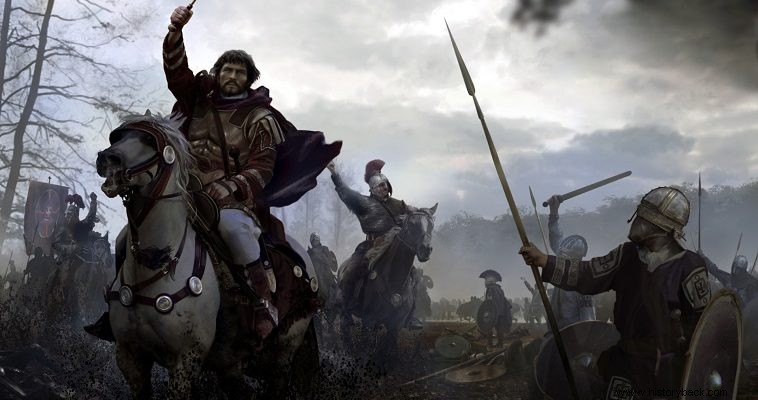
Rimini is a city in Italy known for the glorious, eponymous, battle and victory of the Greeks of the 3rd Mountain Brigade against the Germans in 1944. But it was not the first time that there was a Greek combatant presence in the city. And not only did it exist, but it was led by one of the greatest generals in history, Belisarius. Justinian had decided to recover Italy that had been conquered by the "Eastern Germans", the Ostrogoths, whose king, at that time, was Wittigis.
The Byzantine army, led by Belisarius, had accomplished much, but its small forces could do no more. So the Ostrogoths counterattacked and besieged Belisarius in Rome. In 583 AD as a distraction, Belisarius ordered John's general to move, at the head of only 2,000, but selected, horsemen towards the region of Picentini (Greek:Pikinon) which extended east of the Apennines, to the shores of the Adriatic.
Disobedience and siege
John did indeed move there and when the people of Rimini (then Ariminum) asked him to liberate their city he moved there because from Rimini the Byzantines could threaten the Ostrogothic capital, Ravenna. strong> John hoped that this threat would force Wittigius to lift the siege of Rome.
Indeed John moved towards Rimini. His small force met the Ostrogoths of general Olitheus, which he defeated and entered the city. When Whitigis was informed of this development he actually lifted the siege of Rome and moved towards Rimini with the intention of recapturing the city. Belisarius understood the intentions of the Ostrogothic king and he sent two of his officers, the Germanus Ildigeros and Martinus with infantry to undertake the defense of the city, releasing also his valuable, but unsuitable for a siege operation, elite cavalry.
John, however, refused to leave and instead joined his forces with the men of the other two generals, driving them away! John, who bore the nickname "the bloodthirsty", had bad relations with Belisarius. In this case his disobedience is partly justified because of the strategic value of the city which was not to fall back into the hands of the enemy. But on the other hand he deprived his commander of the best part of the army that he entrusted to him.
The movement of the tower
At the time Ildigeros and Martinus were returning to Belisarius, the Ostrogothic king with his army arrived in front of the walls of Rimini and began the siege. Wittigis ordered the construction of a theoretical siege tower. The Byzantines reacted by opening a ditch opposite the tower so that it could not approach the walls, but after a battle the Ostrogoths drove them out of the ditch which they filled with every available material.
But when their tower was pushed onto the trench it sank slightly into it, as the soft soil and branches that the Germans had thrown into the trench could not support the weight of the tower. Each attempt by the Germans to dislodge the tower proved futile and Utygis, fearing his destruction by the Byzantines if he remained there, ordered him to be dragged back.
Then John, seeing the problems of the enemies, made an exit with part of his forces, but after a fierce conflict, he was forced to retreat back into the city. However, the Ostrogoths had suffered heavy losses and so Whitigis did not accept the proposal of his generals to attack the walls directly.
Instead, he decided to besiege it closely so that hunger would force the Byzantines to surrender. In fact, as a distraction, he ordered part of his army to attack Agona. That's what happened. In the meantime the days passed and the besieged began to feel the effects of the blockade. So John secretly sent a messenger to Belisarius asking him to hasten to his rescue.
Sowing panic in enemies
Belisarius did move towards Rimini. He divided his forces into three divisions. One division, under Ildigeros, moved by ships by sea, while a small division, under Martinus, was ordered to approach the besieged city by night and light as many fires as possible so that the Germans would believe that a numerically vast army was coming against them. . The division under Belisarius himself moved towards Rimini from the north. Marching, he encountered a Gothic section which he conquered.
The surviving Ostrogoths rushed to their camp in panic, spreading the panic. When it didn't dawn and the Germans saw the Byzantine ships approaching from the sea, they were terrified. Panicked, led by their king, they abandoned the siege of Rimini and ran for what they thought was a massive Byzantine force!
Belisarius had won a precious and completely bloodless victory against an opponent who was outnumbered at least 2:1 by cleverly maneuvering and deceiving the opponent. But John, who clearly did not like his leader, attributed the victory to Narses because, according to him, Narses persuaded Belisarius to attempt to lift the siege of Rimini. This opinion is probably the product of jealousy, for it would be improbable that a strategic mind like Belisarius would not have realized the importance of the distraction at Rimini.
